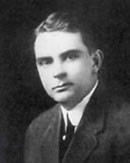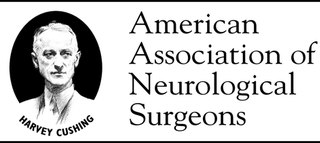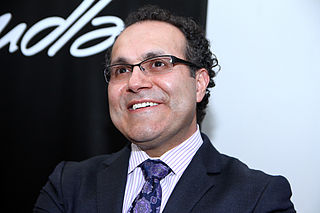
Neurosurgery or neurological surgery, known in common parlance as brain surgery, is the medical specialty concerned with the surgical treatment of disorders which affect any portion of the nervous system including the brain, spinal cord and peripheral nervous system.

Walter Edward Dandy was an American neurosurgeon and scientist. He is considered one of the founding fathers of neurosurgery, along with Victor Horsley (1857–1916) and Harvey Cushing (1869–1939). Dandy is credited with numerous neurosurgical discoveries and innovations, including the description of the circulation of cerebrospinal fluid in the brain, surgical treatment of hydrocephalus, the invention of air ventriculography and pneumoencephalography, the description of brain endoscopy, the establishment of the first intensive care unit, and the first clipping of an intracranial aneurysm, which marked the birth of cerebrovascular neurosurgery.
Dr. H. Richard Winn is an American neurosurgeon, and professor of neurosurgery and neuroscience at Mount Sinai School of Medicine. Winn was chairman of neurological surgery at the University of Washington School of Medicine from 1983 to 2002. Winn has made numerous contributions to the field of neurosurgery, specifically to the physiology of cerebral blood flow regulation and clinical studies of the natural history of cerebral aneurysms. A leading international Neurosurgical Prize is named after Dr. Winn.

The American Association of Neurological Surgeons (AANS) is a scientific and educational association focused on advancing the specialty of neurological surgery. The organization has over 8,000 members around the world. It is one of the five Continental Associations of the World Federation of Neurosurgical Societies (WFNS), the other four being the AASNS, CAANS, EANS and FLANC.
Brian T. Andrews is a neurosurgeon specializing in pediatric neurosurgery, minimally invasive spinal surgery, brain tumors, neuro-oncology, neurotrauma, spinal stenosis and general neurosurgery. He is chairman of the Department of Neurosciences at California Pacific Medical Center and a founder of the California Pacific Neuroscience Institute.

Alfredo Quiñones-Hinojosa is a Mexican-American neurosurgeon, author, and researcher. Currently, he is the William J. and Charles H. Mayo Professor and Chair of Neurologic Surgery and runs a basic science research lab at the Mayo Clinic Jacksonville in Florida.

Gail Linskey Rosseau is Clinical Professor of Neurosurgery at George Washington University School of Medicine and Health Sciences, Washington, D.C. Prior to this position, she was Associate Chairman of Inova Fairfax Hospital Department of Neurosciences. She previously served as director of skull base surgery of NorthShore University HealthSystem. She is board-certified and has been an examiner for the American Board of Neurological Surgery. She has been elected to the leadership of the American Association of Neurological Surgeons, World Federation of Neurosurgical Societies, and the Société de Neurochirurgie de Langue Française.

Michael L. J. Apuzzo is an American academic neurological surgeon, the Edwin M. Todd/Trent H. Wells, Jr. Professor Emeritus of Neurological Surgery and Radiation Oncology, Biology, and Physics at the Keck School of Medicine, of the University of Southern California. He is also editor emeritus of the peer-reviewed journals World Neurosurgery and Neurosurgery. He is distinguished adjunct professor of neurosurgery at the Yale School of Medicine, distinguished professor of advanced neurosurgery and neuroscience and senior advisor, at the Neurological Institute, Wexner Medical School, The Ohio State University, and adjunct professor of neurosurgery, Weill Cornell Medicine, Department of Neurological Surgery & Weill Cornell Brain and Spine Center.
Frank Henderson Mayfield, was an American neurosurgeon and founder of the Mayfield Clinic and Spine Institute in Cincinnati, Ohio. A pioneer in brain and spine surgery, he invented the spring aneurysm clip and the Mayfield skull clamp. Mayfield is best known for his clinical interests in peripheral nerve and spine injuries, development of neurosurgical instruments, and medical politics.

Aaron A. Cohen-Gadol is a professor of neurological surgery in the department of neurosurgery at Indiana University School of Medicine and a neurosurgeon at Indiana University Health specializing in the surgical treatment of complex brain tumors, vascular malformations, cavernous malformations, etc. He performs removal of brain tumors via minimally invasive endoscopic techniques, which use the nasal pathways instead of opening the skull.

The Council of State Neurosurgical Societies is a professional body and an American surgical society created in 1976 to provide a national forum for the State Neurosurgical Societies of the United States of America. As a forum for practicing neurosurgeons, it focuses primarily on discussion, consideration, and proposals of action regarding socioeconomic issues concerning neurological surgery. The CSNS is composed of active neurosurgeons which are members of the various state neurosurgical societies in the ratio of 1 representative per 50 state society neurosurgeon members. The Presidents of the AANS and CNS appoint members/delegates to the CSNS in addition to the state designated delegates and 13 neurosurgery residents are elected as delegates from the four Quadrants with one selected from the Armed Services. The Council meets twice a year just before the annual meetings of the AANS and the CNS during which it considers resolutions submitted by delegates or its committees and receives reports from those committees as well as the AANS and CNS. Resolutions that are adopted by assembly vote are sent to the AANS/CNS for consideration and potential implementation.

James Rutka is a Canadian neurosurgeon from Toronto, Canada. Rutka served as RS McLaughlin Professor and Chair of the Department of Surgery in the Faculty of Medicine at the University of Toronto from 2011 – 2022. He subspecializes in pediatric neurosurgery at The Hospital for Sick Children (SickKids), and is a Senior Scientist in the Research Institute at SickKids. His main clinical interests include the neurosurgical treatment of children with brain tumours and epilepsy. His research interests lie in the molecular biology of human brain tumours – specifically in the determination of the mechanisms by which brain tumours grow and invade. He is the Director of the Arthur and Sonia Labatt Brain Tumour Research Centre at SickKids, and Editor-in-Chief of the Journal of Neurosurgery.
Rahul Jandial is an American, dual-trained brain surgeon and neuroscientist. He is also an author with his books translated to over 10 languages.

Antonio Bernardo is an Italian-American neurosurgeon and academic physician. He is a professor of Neurological Surgery and the Director of the Neurosurgical Innovations and Training Center for Skull Base and Microneurosurgery in the Department of Neurological Surgery at Weill Cornell Medical College. He has gained significant notoriety for his expertise in skull base and cerebrovascular surgery, and has published extensively on minimally invasive neurosurgery. He is a pioneer in the use of 3D technology in neurosurgery and a strong advocate for competency-based training in surgery.
Charles Anthony Fager was an American neurosurgeon, medical academic, and leader at the Lahey Hospital & Medical Center.
Stewart Dunsker M.D., a neurosurgeon, is Professor and Director of Spinal Neurosurgery at the University of Cincinnati College of Medicine, and Director of the Department of Neurosurgery at the Christ Hospital, Cincinnati, Ohio.
Ricardo Jorge Komotar is an American neurosurgeon who specializes in the field of brain tumors. He serves as director of the University of Miami Brain Tumor Initiative, director of the UM Neurosurgery Residency Program, and director of the UM Surgical Neurooncology Fellowship Program.
Nelson M. Oyesiku is a Nigerian-American professor of neurosurgery and endocrinology. With a specialty in pituitary medicine and surgery, currently, he is the chair of the department of Neurological Surgery and Professor of Medicine (Endocrinology) at the University of North Carolina in Chapel Hill. he has been editor-in-chief of Neurosurgery, Operative Neurosurgery, and Neurosurgery Open. He was previously chair of the American Board of Neurological Surgery, among other organizations.
Gabriel Zada is Professor of Neurological Surgery at the University of Southern California. He is known for his expertise in brain tumor and pituitary tumor surgery and as an innovator in minimally invasive cranial surgery. Zada is the director of the USC Brain Tumor Center, USC Endoscopic Skull Base Surgery Program and USC Radiosurgery Center. He is also an NIH-funded principal investigator at the Zilkha Neurogenetic Institute. He specializes in endoscopic and minimally invasive neurosurgical techniques. During his career, he has published over 200 peer-reviewed articles on various neurosurgical topics, and holds numerous U.S. patents pertaining to minimally invasive neurosurgery and surgical devices.

Claire Karekezi is a Neurosurgeon at the Rwanda Military Hospital in Kigali, Rwanda. As the first woman neurosurgeon in Rwanda, and one of eight neurosurgeons serving a population of 13 million, Karekezi serves as an advocate for women in neurosurgery. She has become an inspiration for young people pursuing neurosurgery, particularly young women.











